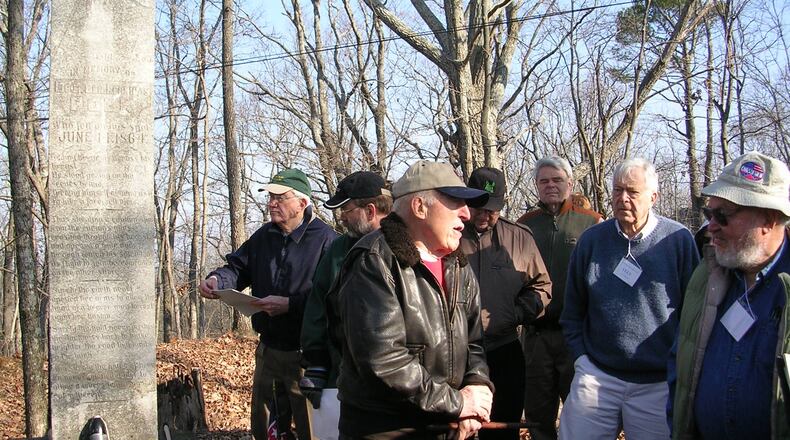WAR IN OUR BACKYARDS
See our special digital presentation of Atlanta and the Civil War at myajc.com/civil-war
Fred Bentley Sr. held history in his hand — a cannon shell, the same sort that killed a Confederate general who had the misfortune to catch the eye of Union Gen. William T. Sherman. Both gentlemen were near Marietta on a June day 152 years ago.
According to all accounts, the man credited with burning Atlanta saw a trio of Confederate officers atop nearby Pine Mountain. He ordered his artillerymen to dispatch them. Moments later, cannons boomed.
Two escaped, but a shell found Major Gen. Leonidas Polk, hitting him in the chest. An obelisk marks the spot where he fell. It stands in Bentley's front yard, where the Marietta lawyer hosts a ceremony each June 14 to note the general's demise.
Historians wish there were more people like Bentley, a lover of all things historic. He is a private landowner who has preserved a historic Civil War site.
Georgia is dotted with an estimated 380 Civil War sites. They range from anonymous little places where soldiers slept to battlefields where they died. A 1998 survey estimated that about 350 are in private hands, meaning they usually aren’t protected from development. Only Virginia and Tennessee have more sites, historians say.
Just how vulnerable these sites can be is underscored by the debate over whether to rezone 24 acres encompassing a historically significant site near Dallas. After months of discussion, the Cobb County Planning Commission in May voted not to rezone part of the Mud Creek Line. A series of entrenchments, the line stretched west of Marietta and was one of several that Confederate forces used as Union soldiers pressed toward Atlanta in spring and summer 1864.
A developer had applied to the county to rezone the site to build a shopping center, plus senior citizen housing.
The vote represents a victory for Civil War enthusiasts such as Charles Crawford, who probably knows more about the war in Georgia than the generals who plotted that 1861-65 conflict.
It hardly means he and other like-minded preservationists can relax. The rebounding economy, Crawford thinks, will put other areas in peril as developers renew building across the metro area and elsewhere.
"I wish I had a bottomless checkbook" to buy the sites, said Crawford, president of the Georgia Battlefields Association. The nonprofit works with other organizations to preserve or reduce damage to historic sites.
He periodically visits landowners in the metro area with significant sites. Sometimes, with property owners’ blessings, he brings small tours.
“A lot of people are aware that they’ve got something” historically significant, he said. The spread of the Internet has made it easier for people to track the history of their property. Longtime neighbors often are willing to fill in any gaps of knowledge, too.
But knowing about a tract’s past is no guarantee it will be saved.
Preserve or bulldoze?
The issue of building or preserving history goes to the heart of a philosophical question: What is more important, landowner rights or the need for Americans to know their past?
It's a query the Civil War Trust confronts regularly. The nonprofit organization, based in Washington, for years has watched historically significant sites vanish under bulldozer blade and truck tire. The trust concentrates mainly on the preservation of battlefields, said Jim Campi, the organization's policy and communications director.
It also watches while other sites get paved over or dug up, he said.
“If you look beyond battlefields,” he said, “you get into other properties.”
Such as a rolling wood where soldiers once camped — now a tract where a developer envisions a collection of homes. Or the faint outline of a trench where soldiers once crouched — now in the middle of a proposed shopping center.
“You see that all over the place,” Campi said.
Just how extensive the war was in the metro area became clear two years ago when the Atlanta History Center unveiled "War In Our Backyards." A Civil War interactive program, it displayed how the war was fought, and where.
The war was fought across the metro area, noted David Crass, director of the state Department of Natural Resources' Historic Preservation Division. The agency, he said, usually doesn't get involved with privately held Civil War land unless a property owner requests it.
“A lot of owners are darn good stewards of these resources if they’re aware of them,” he said.
Some landowners appreciate the past and try to preserve it, said Crawford. A resident of Dallas, west of Atlanta, has a tract where part of the Battle of Dallas took place. He has pledged never to sell it, Crawford said.
But that man now is in his 80s. Will his family carry out the old man’s wishes?
Crawford also recalled a metro landowner who feared that three Civil War sites on his property might impede his development plans. “He bulldozed them,” said Crawford. “He didn’t want to be told what do with them.”
About the Author
The Latest
Featured


